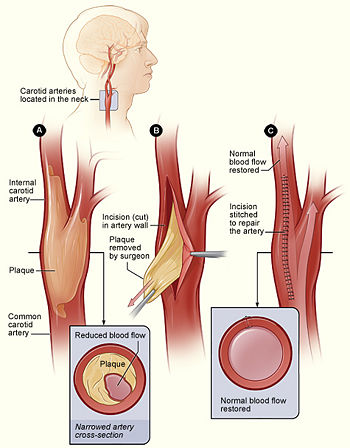Carotid endarterectomy
In medicine, carotid endarterectomy, or CEA, is "excision of the thickened, atheromatous tunica intima of a carotid artery."[1] This is done to prevent a stroke.
Concomitant aspirin may decrease complications.[2][3]
Effectiveness
CEA can benefit patients with[4] and without[5] symptoms according to systematic reviews by the Cochrane Collaboration and the American Academy of Neurology[3].
Angioplasty with stents have less short term effect, but similar intermediate term effect as carotid endarterectomy.[6] Stents may be more likely to impair the carotid baroreflex.[7][8]
Preoperative assessment
The preoperative care includes assessment for coronary heart disease. In one study, 40% of patients had coronary heart disease, with 18% of the patients (or 48% of those with coronary heart disease) had severe disease (obstruction of the left main or three of the arteries).[9] The strongest predictor of coronary heart disease was the presence of diabetes mellitus. The presence of bilateral carotid disease was not a significant prediction of coronary disease. The presence of cardiac symptoms probably increasess the likelihood of coronary disease.[10]
The role of coronary angiography[11] and myocardial revascularization[12] are not established. A cohort study suggests that myocardial revascularization should be done first as a separate procedure.[13]
Adverse effects
Carotid endarterectomy may both cause[14][15]and improve[16][17] orthostatic hypotension and "vasodepressor-type carotid sinus syndrome caused by compression of the carotid baroreceptors by atherosclerotic plaques."[17]
References
- ↑ Anonymous (2025), Carotid endarterectomy (English). Medical Subject Headings. U.S. National Library of Medicine.
- ↑ Taylor DW, Barnett HJ, Haynes RB, et al (June 1999). "Low-dose and high-dose acetylsalicylic acid for patients undergoing carotid endarterectomy: a randomised controlled trial. ASA and Carotid Endarterectomy (ACE) Trial Collaborators". Lancet 353 (9171): 2179–84. DOI:10.1016/S0140-6736(99)05388-X. PMID 10392981. Research Blogging.
- ↑ Jump up to: 3.0 3.1 Chaturvedi S, Bruno A, Feasby T, et al (September 2005). "Carotid endarterectomy--an evidence-based review: report of the Therapeutics and Technology Assessment Subcommittee of the American Academy of Neurology". Neurology 65 (6): 794–801. DOI:10.1212/01.wnl.0000176036.07558.82. PMID 16186516. Research Blogging.
- ↑ Cina CS, Clase CM, Haynes RB (2000). "Carotid endarterectomy for symptomatic carotid stenosis". Cochrane Database Syst Rev (2): CD001081. DOI:10.1002/14651858.CD001081. PMID 10796411. Research Blogging.
- ↑ Chambers BR, Donnan GA (2005). "Carotid endarterectomy for asymptomatic carotid stenosis". Cochrane Database Syst Rev (4): CD001923. DOI:10.1002/14651858.CD001923.pub2. PMID 16235289. Research Blogging.
- ↑ Meier P, Knapp G, Tamhane U, Chaturvedi S, Gurm HS (2010). "Short term and intermediate term comparison of endarterectomy versus stenting for carotid artery stenosis: systematic review and meta-analysis of randomised controlled clinical trials.". BMJ 340: c467. DOI:10.1136/bmj.c467. PMID 20154049. Research Blogging.
- ↑ Cayne NS, Rockman CB, Maldonado TS, Adelman MA, Lamparello PJ, Veith FJ (2008). "Hemodynamic changes associated with carotid artery interventions.". Perspect Vasc Surg Endovasc Ther 20 (3): 293-6. DOI:10.1177/1531003508323732. PMID 18930940. Research Blogging.
- ↑ Yakhou L, Constant I, Merle JC, Laude D, Becquemin JP, Duvaldestin P (2006). "Noninvasive investigation of autonomic activity after carotid stenting or carotid endarterectomy.". J Vasc Surg 44 (3): 472-9. DOI:10.1016/j.jvs.2006.06.004. PMID 16950419. Research Blogging.
- ↑ Shimada T, Toyoda K, Inoue T, et al (October 2005). "Prediction of coronary artery disease in patients undergoing carotid endarterectomy". J. Neurosurg. 103 (4): 593–6. PMID 16266039. [e]
- ↑ Chimowitz MI, Weiss DG, Cohen SL, Starling MR, Hobson RW (April 1994). "Cardiac prognosis of patients with carotid stenosis and no history of coronary artery disease. Veterans Affairs Cooperative Study Group 167". Stroke 25 (4): 759–65. PMID 8160217. [e]
- ↑ Massie MT, Rohrer MJ, Leppo JA, Cutler BS (June 1997). "Is coronary angiography necessary for vascular surgery patients who have positive results of dipyridamole thallium scans?". J. Vasc. Surg. 25 (6): 975–82; discussion 982–3. PMID 9201157. [e]
- ↑ McFalls EO, Ward HB, Moritz TE, et al (December 2004). "Coronary-artery revascularization before elective major vascular surgery". N. Engl. J. Med. 351 (27): 2795–804. DOI:10.1056/NEJMoa041905. PMID 15625331. Research Blogging.
- ↑ Li Y, Walicki D, Mathiesen C, Jenny D, Li Q, Isayev Y et al. (2009). "Strokes after cardiac surgery and relationship to carotid stenosis.". Arch Neurol 66 (9): 1091-6. DOI:10.1001/archneurol.2009.114. PMID 19752298. Research Blogging.
- ↑ Nouraei SA, Al-Rawi PG, Sigaudo-Roussel D, Giussani DA, Gaunt ME (April 2005). "Carotid endarterectomy impairs blood pressure homeostasis by reducing the physiologic baroreflex reserve". J. Vasc. Surg. 41 (4): 631–7. DOI:10.1016/j.jvs.2005.01.009. PMID 15874927. Research Blogging.
- ↑ Azuma Y, Imai K, Oda K, Niwa F, Makino M, Oshima F (October 2007). "[Case of baroreflex failure after bilateral revascularization of the cervical carotid artery]" (in Japanese). Rinsho Shinkeigaku 47 (10): 657–61. PMID 18095499. [e]
- ↑ Hirschl M, Kundi M, Blazek G (July 1996). "Five-year follow-up of patients after thromboendarterectomy of the internal carotid artery: Relevance of baroreceptor sensitivity". Stroke 27 (7): 1167–72. PMID 8685922. [e]
- ↑ Jump up to: 17.0 17.1 Akiyama Y, Hashimoto N, Morimoto M (February 1999). "Orthostatic hypotension improved after bilateral carotid endarterectomy--case report". Neurol. Med. Chir. (Tokyo) 39 (2): 153–6. PMID 10193149. [e]
